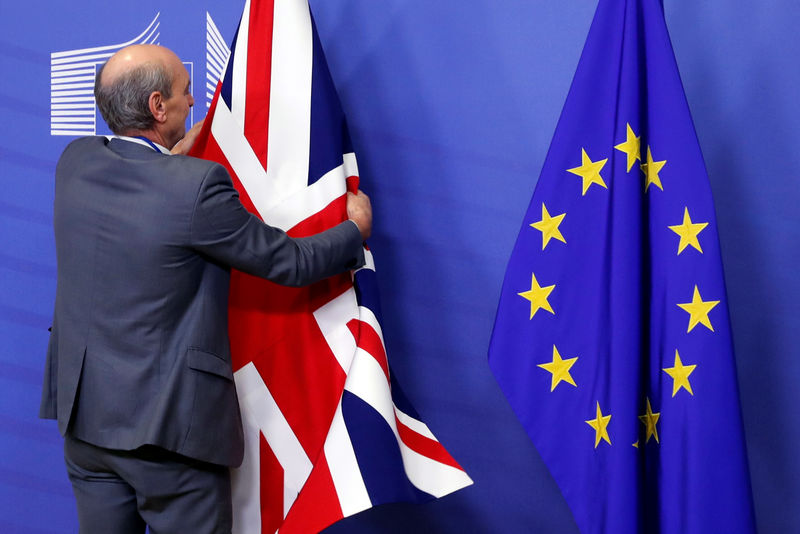 © Reuters. A staff member adjusts the British flag ahead of Britain’s Prime Minister Theresa May’s arrival, at the European Commission headquarters in Brussels
© Reuters. A staff member adjusts the British flag ahead of Britain’s Prime Minister Theresa May’s arrival, at the European Commission headquarters in BrusselsBy William Schomberg
LONDON (Reuters) – The British government and the Bank of England are likely to step up their warnings on Wednesday of a hit to the economy from a no-deal Brexit, potentially helping Prime Minister Theresa May to tackle deep opposition to her plan.
Barely four months before Britain is due to leave the European Union, May has failed to get much of her own Conservative Party behind the agreement sealed with EU leaders on Sunday, leaving open the possibility of a no-deal Brexit.
BoE Governor Mark Carney and finance minister Philip Hammond have both previously stressed the importance of a transition period, as included in May’s plan, to ease Britain out of its four-decade membership of the EU.
Carney said last week that the impact of leaving the bloc without a transition could be akin to the 1970s oil crisis for the world’s fifth-biggest economy.
But the prospect remains of a disruptive Brexit, given the scale of opposition to May’s plan in parliament where it faces a vote on Dec. 11.
The National Institute of Economic and Social Research has said May’s Brexit deal — which foresees Britain striking a trade agreement with the EU or remaining in a customs union — is likely to mean the economy will be 3.9 percent smaller by 2030 than if it stayed in the EU.
That would be equivalent to about 1,100 pounds ($1,400) per person per year.
But some Brexit supporters argue that a more definitive break with the EU would eventually help Britain’s economy by making it easier to strike trade deals with faster-growing countries and regions beyond Europe.
Many voters ignored government warnings of a dire outcome for the economy when they decided to leave the EU in the 2016 referendum and it is not clear that lawmakers will be swayed by forecasts about the effects of a no-deal Brexit.
The government is expected to publish on Wednesday morning its assessment of the impact of different Brexit outcomes including a comparison with remaining in the EU.
Then, at 1630 GMT, the BoE will publish its assessment of the implications for interest rates and its oversight of the banking sector arising from different Brexit scenarios.
Carney and other senior officials at the central bank have warned investors not to count on cuts to borrowing costs in the event of a no-deal shock to the economy, saying it could push up inflation sharply as well as damage growth.
Alongside its Brexit analysis, the BoE will publish its regular Financial Stability Report and results of its 2018 stress tests of banks in Britain.
The Financial Conduct Authority, Britain’s financial markets regulator, will publish its own Brexit impact report at 1630 GMT on Wednesday too.
Fusion Media or anyone involved with Fusion Media will not accept any liability for loss or damage as a result of reliance on the information including data, quotes, charts and buy/sell signals contained within this website. Please be fully informed regarding the risks and costs associated with trading the financial markets, it is one of the riskiest investment forms possible.
Source: Investing.com




























